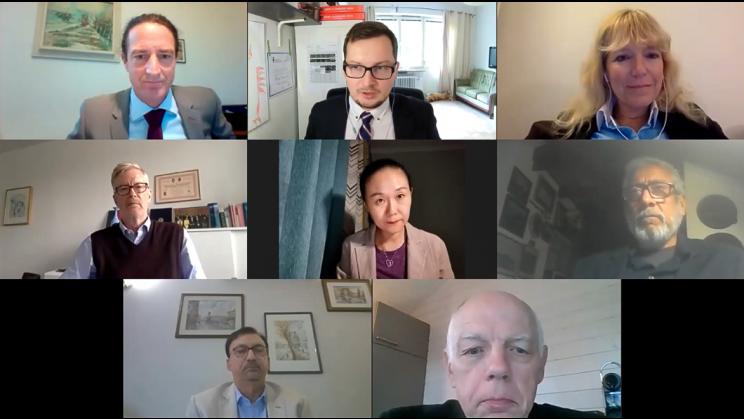
On 29 September, SIPRI hosted a webinar on ‘South Asia’s Nuclear Future: SIPRI’s Project Findings’, which is the final event in its project on nuclear challenges in South Asia. The discussion was based on the findings of the recent SIPRI Insights on Peace and Security paper, ‘Reinvigorating South Asian Nuclear Transparency and Confidence-building Measures’.
The two previous workshops invited experts from Australia, China, India, New Zealand, Pakistan, Russia and the United States to analyse regional nuclear challenges and to identify nuclear transparency and confidence-building measures. This final webinar sought to place SIPRI’s project findings in the public discourse and to receive feedback from a distinguished set of speakers and a broader audience. With a focus on practical policy recommendations to mitigate nuclear risks in South Asia, the webinar offered a diverse range of views from both inside and outside the South Asian region.
In addition to its audience of about 50 participants, Dr Petr Topychkanov moderated a panel of distinguished speakers that included Air Commodore (Retd) Khalid Banuri, Former Director-General, Arms Control and Disarmament Affairs, Pakistan’s Strategic Plans Division; Vice Admiral (Retd) Vijay Shankar, Former Commander-in-Chief, Strategic Forces Command, Indian Armed Forces; Senior Colonel Dr Lu Yin, Associate Professor, National Security College, National Defense University, People’s Liberation Army; Dr Lora Saalman, Associate Senior Fellow, SIPRI; and Dr Christian Wagner, Senior Fellow, Stiftung Wissenschaft und Politik. Dan Smith, Director of SIPRI, and Robert Siegfried, Head, Division for Nuclear Disarmament, Arms Control and Non-Proliferation, German Federal Foreign Office, opened the webinar with introductory remarks.
Watch the video recording here.
About the project
The SIPRI project ‘Assessing Nuclear Deterrence Risks and Challenges in South Asia’ seeks to facilitate regional dialogues to enhance awareness of the escalatory risks associated with expanding nuclear capabilities and introducing advanced technologies. The project aims to provide background and context for understanding nuclear risks through these interactions, particularly given recent tensions at the India–Pakistan and China–India borders. It also seeks to use regional dialogues to identify nuclear risk prevention and mitigation measures involving regional and external actors. The project’s long-term objective is to expand the dialogue on nuclear postures beyond the five nuclear weapon state members of the 1968 Treaty on the Non-Proliferation of Nuclear Weapons (Non-Proliferation Treaty, NPT). While acknowledging the importance of the dialogue among these five countries, this project explores potential ways to engage nuclear-armed states inside and outside the NPT framework in substantial exchanges on doctrines and capabilities. In addition to the workshops, the project has posted several online commentary pieces, launched a video series in February 2021 and published a report in April 2021. Two further reports were published in September 2021. This project is funded by a grant from the German Federal Foreign Office.